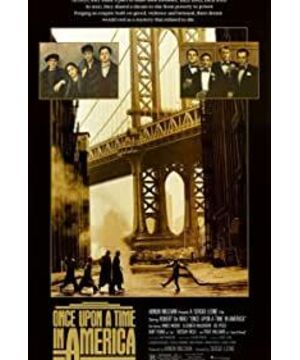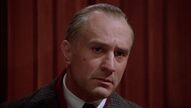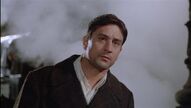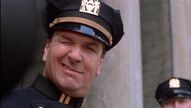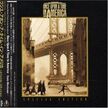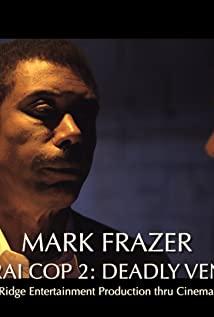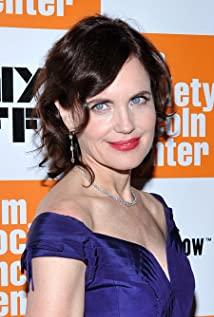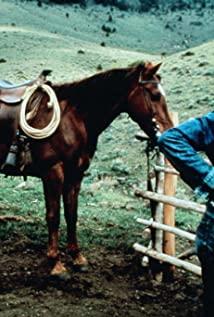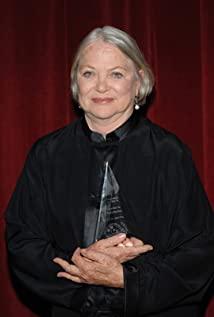"Once Upon a Time in America" has thousands of touching details, taking love as an example. In the line of love, there are not only innumerable emotional details, but also innumerable secret lines that make people feel chills. Even after reading these details, you can understand why this movie ends in such a way. Take the 251-minute extended version as an example. The extended version has 20 minutes more details and more heart-wrenching regrets.
Age cannot wither her Age cannot wither her.
-"Once Upon a Time in America"
The discussion of love in "Once Upon a Time in America" is sacred. He is the most sacred love enlightenment in a man's heart. No matter how many loves a man has experienced in his life, the most memorable thing is his first love. First love is always in a man's heart. Myth. The favorite of noodles in his life is Deborah. Noodles' lifelong fascination with Deborah is universal. It contains all the ignorance, infatuation, awe and regret of a man in the enlightenment of love and sex.
"Everything that makes people happy will often become the source of his misfortune" (Goethe). This is the case for his first love. Deborah is the happiness that noodles never get in his life, so it has become the biggest pain in the heart of noodles. This pain is enough to make him more in awe and more awe than when he was young when he passed the South Tower 35 years later. With a desolate mood, I went to see the lover's face again.
Deborah is to noodles what Ludi is to Witt, and Catherine is to Heathcliff. Like Heathcliff, Noodles used to rape Deborah who was about to leave him because of love and hatred. This is the most unbearable scene in the whole film. The complete despair of love. In the anger of the noodles and Deborah's vigorous resistance, everyone can feel the pain of the love being torn apart, which is the resentment caused by the selfish heart after not getting it. Love is the most mysterious thing in the world. It is selfless and selfish. It doesn't matter whether it is right or wrong. When love is not available, it will always go to the opposite of love, hate. But the root of this hatred is love. As time goes by, this hate becomes more complicated. In the end, only regret and the most powerful poison in the midnight dream come back after many years.
The arrogance and selfishness of love lies in the desire to possess and desire to control. The person who gives control is out of love, but completely ignores the feelings of the other person. Deborah said to Noodles: You are the only person I care about in my life, but you are also the kind of person who locks me in the house and throws away the keys, right? Noodles bow their heads and neither admit nor deny it. This is also the reason for the separation of the two.
The sad thing about love is that no matter it is gained or lost, it will leave endless regrets. "Once Upon a Time in America" is filming this kind of sadness and perfectly blends it with the ridiculousness of life, and it becomes the line that sighs that life is like a dream. A side line of Noodles, the separation between Noodles and Deborah was not as Deborah expected. Deborah became the mistress of Max, her most hated, and Noodles never dreamed that the tragedy of her life came from her. A knife stabbed in the back by the brother
...
"Once Upon a Time in America" is a classic of non-linear narrative. The advantage of non-linear narrative is that it can break narrative conventions and explain the most appropriate information at the most appropriate time, thereby increasing suspense and making the ending more shocking. This is the non-linear narrative of the Nolan Brothers. The perfect representative. In the opening 30 minutes of "Once Upon a Time in America", we unintelligibly experienced the vicissitudes of the world from many suspense and foreshadowings, and initially felt a glimpse of this four-hour magnificent epic. At this time, we still don’t know. What kind of story is "Once Upon a Time in America", but its countless foreshadowings and its endless sorrowful texture are already like a long lyrical narrative poem, with its bitter wine and strong connotation holding us tightly. . In this mood, all we have to do is to step into this unbearable memory with the white-haired old man in sixties, noodles, to feel his feelings and pain his pain.
Ennio Morricone’s soul-sounding music will be the best guide on this road back.
We first felt the joy and feeling of the reunion of old friends in the lyrical music and Robert De Niro's acting skills. From their conversations, we began to know that this restaurant that made countless memories was the starting point of the story. When the noodles wandered here alone In the house of nonsense, we know that the epic has begun when the camera flicks over the photos.
Deborah was the first photo that Noodles noticed, showing Deborah's place in the heart of Noodles.
The camera did not cut, but shook back to the noodles, because the emotions at this time are continuous, and Che will break this feeling. This is the truth that every director who wants to create a poetic image has to understand.
The dark background perfectly highlighted De Niro's face, and De Niro's eyes were dripping blood.
The lens is still not cut. This is a perfect but uncomplicated long lens. The noodles slowly turned around and walked towards a door. Behind the door is more stories.
When the noodles entered the door, the camera naturally switched to the next space.
It’s another long shot. The camera moves with the characters. At this time, we and the noodles see that a door is sealed. This is another visual detail that shows the non-vicissitudes of human beings, and the emotional intensity is deeper. And there is no sense of excess in the natural decentness.
The noodles opened another door, lyrical soprano singing began to appear, and the poetic music was cooperating with the slowly moving camera to draw the audience and the characters into the memories together.
For those who are not watching it for the first time, the next scene is heartbreaking and sighing. The hobbled noodles walk towards first love in awe. This process is as full of ritual as a believer walking towards the goddess in his heart. The audience can feel the infatuation of noodles.
The noodles slowly opened the small hole in the wall, and a shallow beam of light hit his eyes. The sacredness behind the wall hole was a glimpse. This is another visual detail of the director, and the master is the master.
The music has faded.
The eyes of the noodles seem to be dripping blood. If such affectionate eyes can't touch you, I don't know which actor's eyes can touch you.
Then the familiar melody appeared again, which was a symbol exclusive to Deborah. The highest level of the soundtrack is to turn it into a symbol and become the best annotation in the character’s heart. Sergio Leon’s American past is one of the highest interpretations of this usage. In future stories, as long as this music appears Represents Deborah in the heart of noodles. The soundtrack is not just written by the soundtrack. The key depends on how and where the person uses it. Music is like a talent. If it is not placed in the right position, it will not work.
Next is a shot that travels through time and space. This shot is a peek inside the noodles. The director shows us the person who hasn’t seen the noodles at this time and it is impossible to see, and let us understand who is the most unforgettable in the noodles. This lens shows its affection and its pain. I think everyone who has not seen it for the first time will feel the same; secondly, it is a perfect time span, bringing the lens directly back to 50 years ago, back to the magnificent beauty. Years; again, this is the meaning that everyone can see: the appearance of the heroine. This is one of the most gorgeous appearances in the history of film. The appearance of characters, emotional expression, and deep emotional excavation are perfectly integrated. This is the appearance of the most perfect heroine in my heart. Others can take more beautiful pictures than "Once Upon a Time in America", but they can never be richer and more painful.
Jennifer Connelly was so beautiful at that time.
In the following details, we can also feel the estrangement between the two, which paved the way for the subsequent separation.
In the eyes of formalist scholars, repetition is the best way to express the motif. The motif is all hinted by the constant repetition of the elements in the form. By this we can analyze the American past noodles’ infatuation with Deborah and discuss with him. Fall in love with Deborah together. This kind of love is established in the repeated details in the movie.
When the friends and the prostitute Peggy were happily together, the noodles were sitting alone, and the song Deborah's Theme tailored for Deborah by Ennio Morricone sounded outside the screen. As long as the music is played, it means Noodles was thinking about Deborah, and as expected, the next shot was Deborah. The faint female vocals underline the appearance of the goddess. In this film, every appearance of Deborah is beautifully contrasted by the director, which shows the director's intentions. Deborah may be the perfect incarnation of the director's first love.
This is a beautifully long shot. The camera moves slowly with Deborah. Deborah is drowning in the crowd, leaving only the scene of busy traffic on the street.
Everything in the lens, we saw noodles that were almost obsessed.
The noodles followed his goddess in the crowd.
Then there was a line of sight. We saw Deborah in the crowd, but Deborah appeared to be some distance away from us in the space of the picture. This is not only the spatial distance between noodles and Deborah, but also a man chasing a woman. Psychological distance of time.
The continuous movement of the characters in the foreground of the picture caused Deborah's picture to be intermittent, which perfectly mimics the perspective of noodles.
Next is a single shot of Deborah, the picture is full of mist, with a hazy artistic conception beauty that sets Deborah off.
Everyone pay attention to what is behind Deborah's back this time? They are the shoes for ballet dance. What is the detail, this is the detail, this is the embodiment of a director's skill. What kind of person is Deborah? She is a noble person. She and Noodles are not in the same world at all.
Ballet dancing is a manifestation of this nobleness, and since you have set the character to be such a character, you can't give up the details that are sufficient to reflect this at any time and any place.
She is carrying these shoes on her back, which is something that ordinary directors can't think of, and it's also a detail that ordinary audiences can't notice. If you don't have this ability, then you should not be a director.
Deborah is home, and the family is going to church. This is the perfect opportunity for Noodles and Deborah to be alone.
The following drama where the two are alone again explains the differences in their personalities, and the dialogue perfectly interprets the theory of Robert McGee: "Every perfect line must have at least two meanings." You can feel it yourself and not analyze it.
This scene is the first of two solitary scenes between Noodles and Deborah. Both times were dealt with beautifully, romantic and poetic, but both ended without a problem. This scene also buried a lot of The foreshadowing that is difficult to be noticed but is extremely fearful of thought. This foreshadowing has appeared in the play more than once and has become a dark line invisible in the movie.
There was a third person spying on them when they had a tryst, then who was this third person?
Needless to say, you also know: Max.
If you think about this detail for a moment, you know how terrifying this detail is.
Just as Noodles and Deborah offered their first kiss to the audience, a discordant voice suddenly heard outside the door. It turned out that someone was peeping at Deborah, and this person was Max. Deborah sarcastically said the noodles: Go, your mother is calling you.
The mother here refers to Max, and it can be seen that Deborah hates Max very much. This peeping is a foreshadowing. The careful person will find that Max peeped at Deborah in the same place as the noodles, but this detail is less than a second, and most viewers will ignore it. This is the first time that the fate of the three are intertwined. If you regard "Once Upon a Time in America" as a story of betrayal, then this betrayal will lay the groundwork for it.
After 15 years of being released from prison, this foreshadowing reappeared.
When Noodles were sharing their feelings with the brothers who had been away for fifteen years, Deborah appeared. At this time, the first person who noticed Deborah was not Noodles, but Max!
We saw Noodles playing haha with friends, and Max's face had changed, and then Noodles noticed that his goddess was coming.
In other words, the first thing I noticed is not the noodles, but Max. You can contact his expression again, thinking about it with extreme horror .
So the friends left with a sense of interest. Deborah's brother Mo Pang, who understands the sentiment, also played Deborah's dancing tunes for his friend's noodles, and the lighting changed accordingly, very romantic.
But as it was 15 years ago, before the two of them sparked a lot of sparks, Max on the side called out the noodles. At this time, we can also pay attention to Max's face, which makes people feel very inwardly. And Deborah sarcastically said again: Go, your mother is calling you.
This scene hints at us who is the true friend of noodles-Mo Pang, who knows the mind of noodles and creates an atmosphere for him, but when Noodles talks with Deborah, he cuts a shot of Max. Then the results of the following dialogue are self-evident. Pay attention to the content of the dialogue and think carefully about every sentence.
Noodles: Didn't Max tell you that I was released from prison today?
Deborah: No
Noodles: Did you remember it yourself?
Deborah: No, it's Mo Fat. It will always be him.
There are three meanings. First, Max didn’t tell Deborah, why didn’t he tell (this is very interesting); Second, Deborah didn’t take the noodles out of prison in his heart; Third, Mo Pang was always concerned about it. Old friend and told my sister. Regarding Mo Pang’s friendship with noodles, the movie also has a lot of foreshadowings, no longer analyze it, everyone can feel it for themselves. Through these details, we can also speculate why Max's face changes when he sees Deborah coming. Perhaps Deborah was one of the reasons for Max's betrayal of his brother.
The Last Supper
The play of contracting the restaurant was the most infatuating act Noodles did in pursuit of Deborah, but it was also the last time they got along. In order to set off this scene, the director first filmed a scene in which the brothers flirted with the prostitute Carlo. When Carlo gestured to Noodles, he was turned down by Noodles. Noodles said that he had something to do. If something happened, he was going to invite Deborah to dinner. .
The noodles covered the entire restaurant. Everyone was serving Deborah. The waiters on both sides of the screen were waiting for dispatch like a military parade, and the band played Deborah's Theme for Deborah when she debuted. In Wang Shuo's words: this kind of scene deeply loved by the people is moved by everyone. Deborah is touched, I don’t know, I didn’t explain, this is the director’s openness, you think it is, you think it is not.
This is an extremely affectionate scene that makes people feel powerless and distanced. The harder the noodles are, the more indifferent Deborah seems. This can be seen in Deborah's various detailed reactions. Especially when the noodles danced with her arms around Deborah, the director did not let us see the expression of the noodles, only let us see the faces of the two close together, but Deborah was completely absent-minded and absent-minded when dancing, indicating Deborah's love for noodles is also absent.
After the meal, the romantic scene of noodles continued. The two were lying on the beach in front of the hotel, the sea breeze was blowing, and the night sky was washing. There was no better place for whispering between lovers, but it was a desperate place. play. Deborah is here to say goodbye, and she is going to Hollywood.
Noodles did not speak, and the subject of the camera was Deborah. The following is a deceptive transition, using the line of sight to cut to the noodles. According to the inertia of thinking, the audience will think this is the last scene, but in fact they are already in the car.
Noodles looked unwilling and angry. In the end, Noodles raped Deborah in anger. This was his complete despair of the relationship between the two.
In the extended version of "Once Upon a Time in America", the noodles came to the bar and got drunk alone. He met the prostitute Eve in the chaos. He gave Eve money and hoped that Eve would accompany her. On the bedclothes, the noodles said A word that breaks everyone's heart:
Can I call you Deborah? And the background music at this time is exactly the music when Deborah dances!
This detail perfectly shows the character's heart. As mentioned earlier, the highest level of using the soundtrack is to turn it into a symbol. The soundtrack at this time exposes the real world of the character's heart. From these details, we can see how much noodles love Deborah. .
This is so heartbreaking.
The two did not have sex because they drank too much noodles and went to sleep. This highlighted the heartbreak of the noodles. What was even more frustrating was that he missed sending Deborah because of the sadness and decadence of the noodles. Last chance.
From the information provided in the extended version, we found that Deborah was not so unrelenting. She gave the noodles a letter and waited for the noodles in the coffee shop at the train station. But Noodles overslept in the hotel, sad Deborah got on the train and left, while the disheveled noodles rushed in.
The mist from the train station rises like smoke, creating a poetic hazy picture, and the soundtrack is like weeping. The noodles want to take a look at the train where the goddess is leaving, but the scene in front of them is indeed obscured by the mist. This is the director’s god design. Desire and reality deviate to produce drama .
This is the most beautiful parting scene I have ever seen, and now only noodles are left:
At that time, we were waiting for Chilan Bridge, and today we are looking for Huangye Road alone.
People are like the wind into the river and clouds, and the feelings are like rain.
Since then, the noodles have become a zombie who uses opium to paralyze himself.
Reunion
The reunion of Noodles and Deborah is the prelude to the mystery of the whole film, and it is also one of the most heartbreaking scenes in the whole film. The whole life of noodles is destroyed by Deborah and Max.
The arrogance of one person in love is reflected in the fact that he always thinks that the other person is happier with himself. Noodles came back to see Deborah to be angry with himself, to see if Deborah was living better than himself. It turned out that Deborah was right. Deborah became famous and his face was not old, but the noodles were nothing and became a real bad old man. Comparing the gap between the two and Max 35 years later, we can see that the suffering of these 35 years has ravaged the noodles. And Deborah doesn't seem to be as beautiful as it seems on the surface.
It turns out that Deborah did not live better than noodles. She was the mistress of a high-ranking official, and this high-ranking official was Max who died of fraud 35 years ago.
After the truth is revealed, the camera cuts to the next scene, which is a breathtaking shot.
Behind the red background, Max’s ghostly figure slowly walks towards us. This shot is like a nightmare. It is not surrealism, but a glass. This gives a reasonable explanation of reality for this shot. A stroke of magic.
In Max’s office, scenes of past events surfaced in Noodle's mind. Everyone can feel the vicissitudes and emotions that were unattainable yesterday. Apart from heartbreak, I can’t find a more suitable word to describe the movie watching at this moment. Feeling.
Noodles lost everything, love, friendship, status, money. And he has carried the guilt for 35 years for sins that do not belong to him. No one is more miserable than this.
It’s hard to imagine Sergio Leone’s mood when he created it, and how a person commemorates this memory. Behind every heartbreaking love story, there must be a deep wound to the author. Deborah is the perfect representative of this relationship. From the noodles' fascination with her, each of us can see the shadow of our own past. This is also the reason why "Once Upon a Time in America" can continue to impress us.
Goodbye, Deborah;
Goodbye, Max;
Goodbye, my old time.
Tail
"We always want to get rid of the past, but the past never let us go."
At the end of the movie, the scene cuts back to the young man’s noodles. This is the most painful moment of noodles. He smokes a lot of cigarettes in the big smoking hall and smiles at us in an illusion. The camera freezes in the smile left by this painful illusion. , This is a very profound lens. As far as I understand it, it is a freeze frame of time and space, which means that the life of noodles ceased from that moment, and his future life will always be trapped in this not big or small. In space, the most painful time is forever stagnant, where time tends to be still, space no longer changes, and pain lasts forever. (The last laugh of the noodles)
Many people don't like "Once Upon a Time in America" only for one absurd reason, that is, it is too long. But no one asks you to finish it all at once. If you think about it, you have to watch a TV series for at least dozens of hours. If you spend an hour a day watching "Once Upon a Time in America" for a week, can you still not finish it? However, many people just don't understand this truth. Can someone watch a TV show for more than ten hours a day, but can't spare four hours to talk to a great movie?
View more about Once Upon a Time in America reviews


